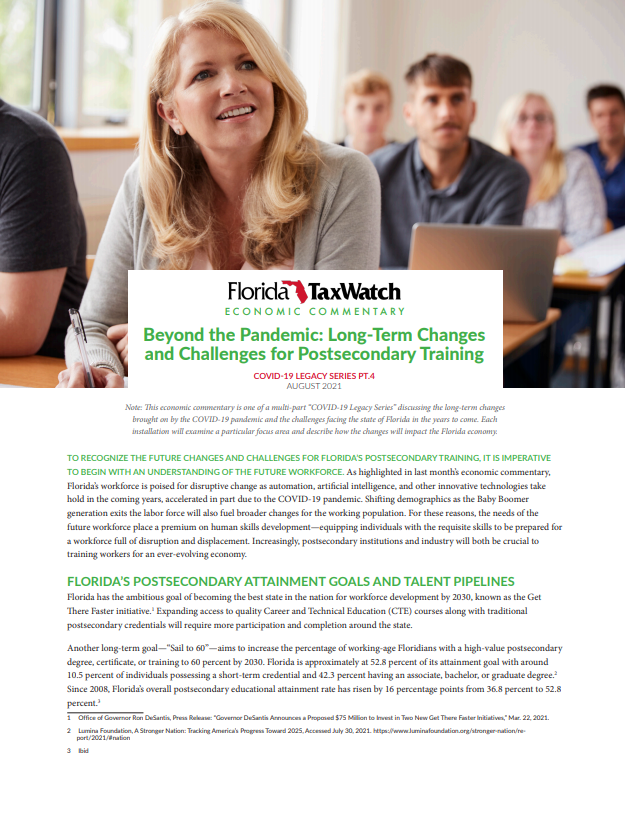Beyond the Pandemic—Long-Term Changes and Challenges for Postsecondary Training

TO RECOGNIZE THE FUTURE CHANGES AND CHALLENGES FOR FLORIDA’S POSTSECONDARY TRAINING, IT IS IMPERATIVE TO BEGIN WITH AN UNDERSTANDING OF THE FUTURE WORKFORCE. As highlighted in last month’s economic commentary, Florida’s workforce is poised for disruptive change as automation, artificial intelligence, and other innovative technologies take hold in the coming years, accelerated in part due to the COVID-19 pandemic. Shifting demographics as the Baby Boomer generation exits the labor force will also fuel broader changes for the working population. For these reasons, the needs of the future workforce place a premium on human skills development—equipping individuals with the requisite skills to be prepared for a workforce full of disruption and displacement. Increasingly, postsecondary institutions and industry will both be crucial to training workers for an ever-evolving economy.
Florida has the ambitious goal of becoming the best state in the nation for workforce development by 2030, known as the Get There Faster initiative. Expanding access to quality Career and Technical Education (CTE) courses along with traditional postsecondary credentials will require more participation and completion around the state.
Another long-term goal—“Sail to 60”—aims to increase the percentage of working-age Floridians with a high-value postsecondary degree, certificate, or training to 60 percent by 2030. Florida is approximately at 52.8 percent of its attainment goal with around 10.5 percent of individuals possessing a short-term credential and 42.3 percent having an associate, bachelor, or graduate degree. Since 2008, Florida’s overall postsecondary educational attainment rate has risen by 16 percentage points from 36.8 percent to 52.8 percent.
For Florida to fully realize its 60 percent postsecondary attainment goal and eventually exceed it, the priorities outlined throughout this commentary offer a basic starting point, such as understanding enrollment trends at institutions and enhancing upskilling priorities with industries. Another innovative approach can be found in the Broward UP model—a community-centric approach to providing postsecondary training to individuals in underrepresented communities. Broward UP directly goes into local areas and provides workforce training programs that lead to in-demand certificates and credentials. A prior TaxWatch analysis found that students are expected to earn an additional $204,000 in lifetime earnings after participating. It should be further studied how a similar model would yield economic value to Florida if employed across the entire state. Additionally, much research remains for understanding the dynamics of postsecondary training throughout the COVID-19 pandemic and beyond.
Documents to download
-
Aug-21-EC(.pdf, 701.38 KB) - 1398 download(s)